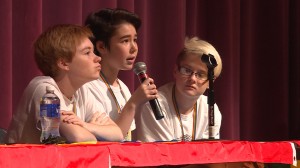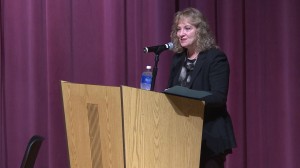Indiana Schools Changing Policies To Include LGBT Students

Three Prism students speak on a panel at Bloomington High School South about making schools more inclusive for LGBT students. State superintendent Glenda Ritz joined the students as part of the panel. (photo credit: Barbara Brosher/WTIU News)
State Superintendent Glenda Ritz joined the conversation this week about how to make schools safer and more inclusive for all students. The backdrop for her announcement was Bloomington High School South, a school in the Monroe County Community School Corporation, which recently updated its anti-discrimination policy to specifically prohibit discrimination or bullying based on a student’s gender identity in addition to sexual orientation and other protected classes.
This policy change comes after a year where LGBT issues dominated politics between the controversy over the Religious Freedom Restoration Act and the Supreme Court ruling in favor of same sex marriage. That conversation is now reaching classrooms in Indiana, and school districts, policy makers and students themselves are learning how to navigate through these changes.
Superintendent Ritz Learns From LGBT Students
Superintendent Glenda Ritz took a seat on the stage at Bloomington High School South Tuesday to engage in a conversation about how to make schools safer and more inclusive, especially for LGBT students.
She was billed as the guest speaker, but she mostly sat back and listened, taking notes as students shared their experiences — good and bad — of teachers addressing LGBT students in the classroom.
“I was talking to a teacher in the classroom about my identity as a bisexual and they just kind of said, ‘Well, you’ll pick one’,” said Isaac, one of the student panelists.

State superintendent Glenda Ritz speaks before the panel discussion on LGBT issues in schools. (photo credit: Barbara Brosher/WTIU News)
The student panelists are members of Prism, a youth group for LGBT students, run by Bloomington Pride. They organized the discussion to help inform school officials on ways to make school more inviting and inclusive for LGBT students, and discussed topics such as gender neutral restrooms, including LGBT relationships in sex education classes and how teachers can be better trained on interacting with this population of students.
After the panel, Ritz said conversations like this are slowly happening at schools statewide.
“Well I think the conversation is out there already with the RFRA conversation, it’s happening all over the state and in our communities and it’s happening in our schools,” she said. “I think that we have students that are feeling empowered so to speak to bring up issues with their administration and I’m excited that we’re having that conversation statewide.”
What Can School Do To Better Accommodate LGBT Students?
MCCSC is a school district taking these conversations and turning them into actions. The district recently updated its anti-discrimination policy to specifically prohibit discrimination against a student based on gender identity. Previously, it included sexual orientation and other protected classes, but after a group of students and community members appealed to the board, the language was expanded to include more students.
The question now is how to take this policy and put it into action to create a better learning environment for LGBT students.
Greg Chaffin, a school counselor at Bloomington High School North, is working to implement some of the changes spelled out in the document. He says having a policy in place helps establish a precedent for eliminating negative attitudes towards LGBT students.
“We can address that bullying, we can make sure it doesn’t happen again, and we have the administration behind us and the entire community behind us when there’s a policy in place,” Chaffin said.
Earlier this year, the Prism students created a curriculum for teachers with different modules to help teachers understand issues LGBT students deal with, and why things such as gender-neutral restrooms and using a student’s preferred pronouns are important to making them feel comfortable at school.
MCCSC asked to use the training, and later this month all of the principals and administrators in the district will participate in a session led by Prism students.

One of the lessons Prism students give to teachers during their trainings, is the importance of using a students preferred pronouns. (photo credit: Barbara Brosher/WTIU News)
“Specifically focused on the forefront on terminology and just making sure everyone understands some of the topics they discussed tonight,” says Tim Pritchett, MCCSC’s spokesperson. “How to address students, what different terms mean and why it’s appropriate and necessary to use them.”
Ritz says she is encouraged by the activism of these students, and although her role as a statewide policy maker doesn’t allow her and the Department of Education to making sweeping changes, they can help local districts if they are thinking about changes similar to what MCCSC is doing.
“What I did come away with are ways that I might be able to support and answer questions when local school corporations are thinking about what they may need to do to address student issues,” Ritz said. “So that’s why I was taking notes and seeing how I’m going to be helpful in the future.”